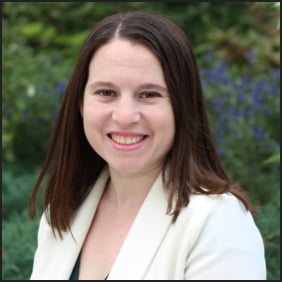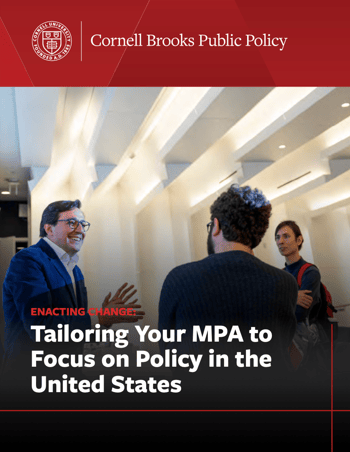Getting an MPA & Focusing on Social Policy in the United States — Jamie's Journey

Jamie Frank is a 31-year-old CIPA alum from Tewksbury, Massachusetts. She pursued the Social Policy concentration when getting an MPA from Cornell, and she now works on the education finance team at the New York State Division of Budget.
She's here to talk about tailoring her MPA to focus on domestic policy and how getting an MPA prepared her for future success.
What first drew you to Cornell’s MPA?
I knew I wanted to earn a degree in public administration, and I was very excited by the caliber of the professors I would be able to work with, the flexibility in curriculum, and the impressive things alumni had gone on to do.
What first interested you in a career in public affairs?
After undergrad, I taught the second grade in a high-poverty school, and I kept finding myself thinking that there were policies in place that kept teachers from being as successful as they could be, so I wanted to learn how effectuate change and then use my experience as a driving force in making those changes.
What concentration did you choose at CIPA?
Social Policy. I wanted to focus on how government (at every level) affects the well-being of children and families.

What drew you to work in domestic policy?
I chose domestic policy because it was an interest to me. I taught domestically and found there were still systems that were worlds apart from each other here in the same country, and it’s where I could do the most good.
After completing your MPA, where did you go on to work?
After graduation, I accepted an offer with the New York State Division of Budget, working on the education finance team. This was a dream offer, as I was able to apply what I had done in my earlier roles in education with what I had studied in school--public finance, public policy, administrative decision making to serve the people of the State of New York.
Explain how Cornell’s MPA prepared you for mission-driven work in domestic policy.
One of the reasons I chose CIPA was the importance of mission-driven work. In my current role, we spend every day advising on policies on how to make life better for the people in the State, and I think some of the experiential work I was able to do with CIPA (the consulting and capstone classes) both had a focus on delivering real results for real people, which helped me to develop that mindset.
Tell us about one faculty member who impacted your future career and prepared you to make an impact in domestic policy.
There are so many faculty members that I am so thankful for having had the opportunity to learn from. One that stands out to me in John Sipple, whom I took statistics from social policy from. He is an education expert as well, so he really helped me define what I wanted to do in education in a non-instructional role, and his stats class helped me developed the quantitative skills necessary for me to succeed.
What’s your favorite thing about the MPA program and Ithaca’s region?
My favorite thing about the MPA program is the flexibility within the concentration courses, so that you can tailor the specific skills you need with content you are interested in. In regard to Ithaca, the natural beauty cannot be overstated, and I miss it very much!
Concentration — Social Policy:
MPA Fellows concentrating in Social Policy learn an array of tools and policy history required for designing, managing, and evaluating programs in their choice of social policy area which include health, nutrition, education, poverty alleviation, aging, criminal justice and others. Much of the fundamental material in this concentration introduces students to problem formulation, identification of policy alternatives to address social concerns, cost-benefit analysis and other tools needed to evaluate policy alternatives and policy implementation strategies.
Further, MPA students who choose the Social Policy concentration have gained employment (either full time or internships) at the following organizations:
- Congressional Research Service
- District of Columbia Public Schools
- Food Bank of Central and Eastern North Carolina
- The Lewin Group
- NY State Council on Children and Families
- Open Door Family Medical Center
- Pancreatic Cancer Action Network
- Teach for America
- US Centers for Disease Control and Prevention
- US Department of Health and Human Services
- US Department of Housing and Urban Development
- The World Bank
Still wondering — is getting an MPA worth it?
We get it: Choosing to go back to school and getting an MPA is an investment. But if you're still wondering if getting an MPA is worth it, we're here to tell you that we have real, measurable data that shows the marketable value of Cornell's MPA program.
So, if you're passionate about the field of public affairs and if you want to learn more about how getting an MPA at Cornell University will enable you to make a real difference in the lives of others, we encourage you to request more information today!



